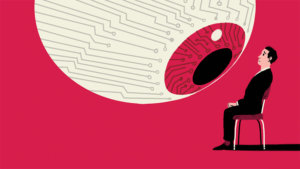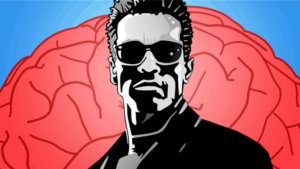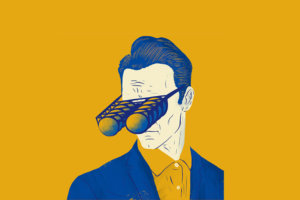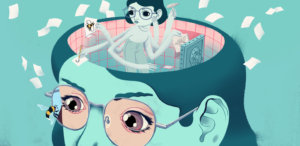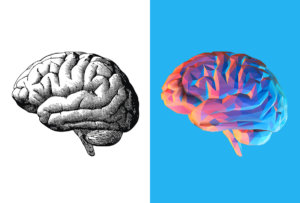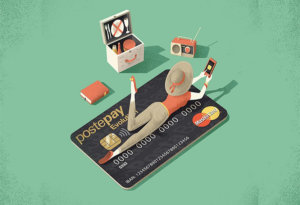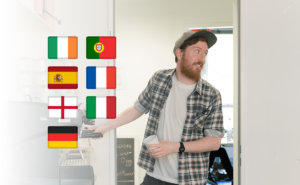You can’t change yourself, so don’t even try. I know, that’s not what TV commercials, seminars, self-help books tell you. But you really can’t change it. They are wrong. Don’t try to change yourself like a thirsty man chasing mirages in the desert. There is nothing there. So stop chasing that effort. Do something else instead.
Why can’t you change yourself? Because this idea of radical change is an arbitrary construct. It’s something you make up to make yourself feel good (or bad).
You didn’t study very well yesterday, but you studied very well today. Did you change in one day?
Both yes and no are correct answers, depending on how you define change. Technically, you’re both constantly changing and never changing. Depends on how you look at it. What you decide to change or not is an imaginary line drawn in your head.
For example, I might decide that “changing myself” means having a billion dollars. Then I’ll live with anger at myself for not being able to “change” for the rest of my life. Therefore, this is not a very useful definition of “change”.
Or I might decide that “changing myself” means not putting ketchup on my fries. If that’s the case, change is very easy. But does my definition of “change” mean anything? Not really.
So…
What is change?

People say something to their therapist and partner that they will finally “change” themselves. In fact, they promise something fictitious and fictitious. Is it a “change” that someone who used to liar will now stop lying? Or is it the continuation of a habit that is permanently and irreversibly “fixed”? Will they really never lie again? And even if they don’t, does that matter?
We don’t know what change is because we don’t know what we are. I woke up tomorrow and did the opposite of everything I did today. Am I a changed person now? Or am I the same person who decided to try something different?
And more importantly, who cares?
I don’t. And neither should you.
The problem with using the word “change” is: it includes your identity. And when you include your identity, you get really emotionally attached to imaginary things. You get angry at yourself, blame others, and decide that you’re actually a worthless piece of shit with no hope in this world.
Saying “I want to go to the gym every week” is one thing. It’s another thing to say, “It’s time for me to change and become the type of person who goes to the gym every week.”
The first statement is simple. You want to go to the gym. So go (or don’t).
The second phrase means that you have to completely reinvent yourself to go to the gym. And this greatly increases the emotional dangers. If you succeed (spoiler: you probably won’t), you’ll gain that happy “new person” feeling that will last until the next time you feel lousy and want to “change” again. If you fail, you punish yourself for your irredeemable laziness.
And that’s the problem with involving your identity. If you fail at something, you start thinking: “Maybe I’m deceiving myself. Maybe I’m not one of those athletes. Maybe it’s not me. So why try?”
Because you have decided that these arbitrary acts represent the integrity of your character, you will see your failure to go to the sport as a judgment of your worth as a person. You will hate yourself. And you will be less motivated to “change” or do something else in the future.
Let’s say you said you will change and you succeeded. If you are successful, you will take a good breath and escape from negative thoughts about yourself for a moment. But soon, this high value will subside and you will have to define a new “change” for yourself to achieve. And you will follow it again. You will become addicted to personal change like drug or alcohol addicts.
Here’s a pro tip for you: there is no such thing as an “athlete”. There are people who just go to the gym. Similarly, there is no such thing as a “productive person”. There are people who do productive work quite often. There is no such thing as an “altruistic person”. There are only selfless people.
It’s not always about you (actually, it’s rarely like that)

It is very important to maintain an identity that is as little defined as possible. This is because when we include our identities (we decide that certain behaviors or events represent our worth as a human being) we become emotionally turbulent. And when things get emotionally turbulent, we tend to do really stupid things.
Instead, think of your life as just a long series of actions and decisions. If you’re like most people, your actions and decisions are less than most ideal. And when most of us say we want to “change” ourselves, what we mean is that we want to take slightly better actions and decisions .
For years I hated mornings. I’ve woken up late almost my entire life. This little snowball made my life a mess. I would stay behind at work all day. So I would work in the middle of the night to try and make up for it. Then I would be tired and stressed the next day. By the end of the week, I’m a wreck. To escape this situation, I would go out to drink, to have fun, which would make me even worse next week.
I still somehow managed to make a career. Don’t ask how. But instead of admitting that I was good despite my own bad habits, I succeeded. I made it a part of who I am. I decided that this was my identity and said:
“Yeah, I’m a nuisance. I hate getting up early. I don’t need that bullshit. That’s what I am. Nights are mine and I can work all night!”
And you can get away with it when you’re 22. But at 32, you can’t.
In my 30s, I started struggling with productivity. And instead of recognizing my terrible habits, I said to myself, “I just I’m not a morning person . I immediately said to myself, “See? This morning thing is not for you. “I would say.
I finally had to get over myself. I had to decide that You know, I don’t know who I am or what I’ve done, but I know this historically, scientifically and anecdotally, and anyone who isn’t stupid does. Waking up early and starting the day with a nice, simple routine is the healthiest and most productive way to live life.
And so did I. I took my identity off him and did it because it was a good thing to do. I’m getting up early now. And I meditate (usually) and eat something healthy.
And does that make me a “morning person”? Does that make me a “productive person”? Who knows? Who cares? I don’t. And I let me do that because I didn’t care.
Keep ‘yourself’ out of your decisions, because most likely it’s not about ‘you’. Ask yourself, “Is this a good thing to do?” Yeah? Then go do it.
Did you fail? Is it still a good thing to do? Yeah? Then go and do it again. And if at any point you find that it’s not as good as you thought, don’t do it again.
Change your actions, not yourself

Those of us who feel stuck in certain habits are stuck because we are embroiled in emotionally unhealthy behaviors. A smoker doesn’t just smoke. They develop a whole identity around smoking. This is their; changes their social lives, eating and sleeping habits, and how they see themselves and others. They become “smokers” to their friends and family. They develop a relationship with cigarettes just as you and I do with a pet or a favorite toy. Or our phones the same way.
When someone decides to “change” themselves and quit smoking, they are essentially trying to “change” their entire identity. No wonder similar New Year’s Resolutions don’t last long, either.
The trick to quitting smoking (or changing any habit) is to realize that your identity, which details the mental frame you have created and labeled as “me,” doesn’t really exist. This is a choice.
You do not smoke You are someone who chooses to smoke. You are not a night person. You are a person who chooses to be active at night and sleep until morning. You are not productive. You are a person who chooses to do things that don’t feel helpful right now. You are not unlovable. You are someone who feels unloved right now.
And changing these actions is simple. In doing so, forget about having a big discussion about who you are or what you are or what people think of you.
Your identity is a made-up thing to which you are emotionally attached. It is a mirage in the desert. An empty refrigerator is a soda bottle. And the fastest way to change yourself is to realize that there is no real self to change.
Translated from the successful author Mark Manson’s article on his website.


